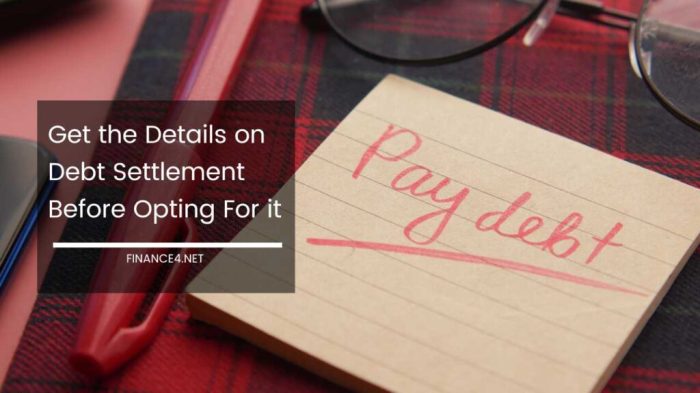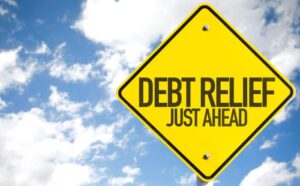
Welcome to the wild world of Debt Settlement, where your financial woes can be transformed into tales of triumph! Imagine if you could negotiate with your creditors as smoothly as bartering for the last slice of pizza at a party—well, that’s the essence of debt settlement! With a sprinkle of strategy and a dash of negotiation flair, you can cut your debt down to size while keeping your sanity intact.
Debt settlement isn’t just a fancy term; it’s a lifeline for those buried under a mountain of bills. By negotiating directly with creditors, you can potentially reduce the amount you owe and avoid the financial black hole of bankruptcy. In this guide, we’ll unravel the ins and outs of debt settlement, provide you with financial strategies to stay afloat, and explore how this journey impacts your credit score.
Grab your favorite snack, and let’s dive into the debt settlement saga!
Understanding Debt Settlement
Debt settlement can often feel like a rollercoaster ride through the financial theme park of life—thrilling, a bit scary, but ultimately a chance to regain control of your financial future. This strategy aims to reduce the amount you owe to creditors, allowing you to settle debts for less than you originally agreed to pay. Let’s peel back the layers of this financial onion and see what makes debt settlement tick.Debt settlement operates on a simple principle: you negotiate with your creditors to pay a reduced amount on your debts.
Picture it as a high-stakes poker game where the stakes are your financial well-being. If you’ve fallen behind on payments and your debts are starting to feel like that stubborn gum stuck to your shoe, creditors may be willing to negotiate. They’d rather get a portion of what you owe than nothing at all, especially if they see you’re struggling financially.
This process typically involves hiring a debt settlement company or doing it yourself, where you will gather funds in a dedicated account to use when negotiating with creditors. Timing and strategy are key, because you want to come to the table with a reasonable offer that doesn’t make you look like you’re trying to pull a fast one.
Negotiating with Creditors
When it comes to negotiating with creditors, preparation is half the battle. It’s like gearing up for a duel at dawn—except this duel involves numbers and a lot less swordplay. Here’s how the process typically unfolds:
1. Assess Your Debts
Start by listing all your debts. Knowing exactly how much you owe will help you understand what’s at stake. It’s like knowing the score before hitting the field.
2. Save for a Lump Sum
Set aside funds in a separate account. This amount will serve as your bargaining chip when the time comes to negotiate. It’s like gathering your resources before entering battle.
3. Reach Out to Creditors
Contact your creditors to discuss your situation. Be honest about your financial struggles; after all, the truth can be a powerful ally in negotiations.
4. Present Your Offer
Once you have saved enough, make an offer to settle the debt for less than the full amount. Aim to convince them that this is better than getting nothing. Remember, you’re not trying to haggle over the price of a used car; you’re trying to save your financial future!
5. Get Everything in Writing
If your creditors agree to a settlement, make sure you get the terms in writing before sending any money. It’s the financial equivalent of sealing a deal with a handshake—just a lot more binding.
6. Follow Up
After settling, confirm that the debt is marked as “settled” on your credit report. You want to ensure that your hard work doesn’t go unnoticed.
Comparison with Other Debt Relief Options
Understanding how debt settlement stacks up against other debt relief options will help you make an informed decision about which path to take. Here’s how debt settlement compares to bankruptcy and debt consolidation:Debt settlement involves negotiating a reduced amount with creditors, whereas bankruptcy is a legal proceeding that can discharge your debts entirely, but with the potential for long-lasting effects on your credit score.
On the other hand, debt consolidation involves combining multiple debts into a single loan, ideally at a lower interest rate, allowing you to manage payments more comfortably.Here’s a quick comparison to help you visualize the differences:| Option | Pros | Cons ||——————-|———————————————————–|————————————————————–|| Debt Settlement | Reduced debt amount and quicker resolution | Potential impact on credit score and may be taxable || Bankruptcy | Complete debt discharge and fresh financial start | Long-term damage to credit score and potential loss of assets || Debt Consolidation | Simplified payments and potentially lower interest rates | Doesn’t reduce total debt and can lead to further debt if not managed well |In essence, each option has its own advantages and disadvantages.
The choice ultimately hinges on your unique financial landscape, goals, and whether you’re feeling lucky enough to negotiate your way out of debt!
Financial Strategies Related to Debt Settlement
Navigating the stormy seas of debt settlement can feel like you’re trying to sail a leaky boat while wearing a blindfold. But fret not! With some savvy financial strategies, you can keep your ship afloat and maybe even find your way to calmer waters. Here’s how to manage your finances effectively during this critical process, along with the role of credit counseling, and some pitfalls to avoid on your epic journey to financial freedom.
Managing Finances During Debt Settlement
As you embark on the thrilling adventure of debt settlement, keeping a tight grip on your finances is essential. Here’s a list of strategies to help you stay on course:
- Create a Budget: Draw up a detailed budget that accounts for your current income, necessary expenses, and debt repayments. Remember, this isn’t just any budget; it’s your financial battle plan!
- Track Your Spending: Keep an eye on where your money goes. Use apps or good old-fashioned spreadsheets to track expenses. Knowledge is power, and in this case, it’s also the key to not blowing your budget on unnecessary items like that inflatable unicorn you don’t need.
- Prioritize Debt Payments: Focus on paying down debts that are most urgent or with the highest interest rates first. It’s like eating your veggies before dessert—unpleasant but necessary!
- Emergency Fund: Set aside a small emergency fund to cover unexpected expenses, so you don’t have to dip back into debt. Think of it as your financial safety net, minus the acrobatics.
The Role of Credit Counseling
Credit counseling serves as a guiding light in your financial fog. These professionals can help you see through the murky waters of debt settlement with useful insights and strategies tailored to your unique situation. Here’s how credit counseling can be beneficial:
- Expert Guidance: Credit counselors have experience dealing with creditors and can negotiate on your behalf for better terms. It’s like having a financial superhero in your corner!
- Debt Management Plans: They can help you set up a debt management plan (DMP) that consolidates your payments into one manageable monthly sum. No more juggling flaming torches while walking a tightrope!
- Education: Counselors often provide education on how to manage your finances better in the long run, ensuring you’re not just putting a Band-Aid on your financial wounds.
Avoiding Pitfalls in Debt Settlement
While debt settlement can be a powerful tool, there are potential pitfalls that could turn your financial ship around. Being aware of these risks will help you navigate safely:
- Scams and Fraud: Be wary of companies that promise to erase your debt for a fee. If it sounds too good to be true, it probably is! Stick to reputable agencies and verify their credentials.
- Tax Consequences: Settling your debts might have tax implications, as forgiven debt can be considered taxable income. It’s like getting a surprise tax bill when you thought you were finally free!
- Credit Score Impact: Debt settlement can negatively affect your credit score. It’s essential to weigh the short-term damage against long-term benefits and have a plan to rebuild your score post-settlement.
“An ounce of prevention is worth a pound of cure.” — Benjamin Franklin
Broader Financial Topics Impacting Debt Settlement

Debt settlement can feel like a rollercoaster ride through a financial funhouse, where every twist and turn impacts your credit score and overall financial health. Understanding the broader financial landscape is crucial for making wise decisions in this realm. Let’s dive into how debt settlement interacts with your credit scores, how to prepare for negotiations like a pro, and best practices for maintaining financial stability afterwards, all while keeping our humor intact.
After all, laughter is the best medicine—except when it comes to your credit report!
Relationship Between Debt Settlement and Credit Scores
Debt settlement isn’t just a fancy term for “I promise to pay you less money,” it’s also a significant player on your credit report. When you settle a debt, it’s like throwing a glitter bomb at your credit score—at first, it looks fun, but the cleanup can be messy! Here’s what happens when you take the settlement route:
- Immediate Impact: Once you settle, your creditor will report the account as “settled” or “charged off,” which can knock your score down a few pegs. Think of it as a bad haircut; it’ll grow back, but the initial shock is real!
- Duration of Effect: This negative mark can linger on your credit report for up to seven years. So, if you’re thinking about buying a mansion with a moat and drawbridge anytime soon, you might want to reconsider your timing.
- Future Borrowing: A lower credit score makes it harder to secure loans, and if you do, expect interest rates that’ll make your wallet weep. You might find yourself sending love letters to your bank, begging for mercy.
The key is to manage your credit wisely post-settlement to regain your financial footing.
Guide to Preparing for a Debt Settlement Negotiation
Negotiating a debt settlement is like entering a battle without armor—it’s essential to come prepared! Here are the steps to arm yourself for the negotiation duel:
- Gather Your Financial Documents: Bring your A-game! Have all relevant documents at your fingertips—bills, statements, and anything else that may come in handy. It’s like a treasure map leading you to victory!
- Know Your Rights: Understand the Fair Debt Collection Practices Act to ensure you’re not being steamrolled by aggressive collectors. Knowledge is power, and in this case, it’s also a shield!
- Set Your Offer: Prepare to offer a lump sum that you can actually afford. Throwing out an offer that’s too low might backfire, leaving you looking like a contestant on a bad reality show.
- Practice Your Pitch: Role-play with a friend, or talk to your pet—just practice! You’ll feel more confident going into the negotiation, and Fido won’t judge your negotiation style.
Best Practices for Maintaining Financial Stability Post-Debt Settlement
Once the dust of debt settlement has settled, it’s time to think about your financial future. Here are some savvy strategies to keep your finances on the straight and narrow:
- Emergency Fund: Building an emergency fund will help cushion any unexpected expenses. Think of it as your financial superhero cape—always ready to swoop in and save the day!
- Budgeting Wisely: Create a budget that Artikels your income and expenses. This will help you avoid falling back into the debt trap. Remember, every dollar counts, so make them work hard for you!
- Estate Planning: Even if you’re not planning to leave behind a castle, having a will and estate plan is crucial. It’s like giving your family a roadmap for when you decide to take that eternal nap.
- Home Equity Loans: While navigating these loans, use them wisely! They can be a double-edged sword—great for emergencies but risky if they plunge you back into debt.
Ultimate Conclusion

As we wrap up this thrilling ride through the landscape of debt settlement, remember that even the most complex financial situations can be tackled with the right knowledge and a few clever tactics. The journey might be bumpy, but with savvy negotiation skills and effective financial strategies, you can emerge victorious, waving goodbye to debt like a superhero in a cape.
So go forth, negotiate away, and reclaim your financial freedom!
FAQ Guide
What is debt settlement?
Debt settlement is a negotiated agreement between you and your creditors to pay less than the full amount owed, typically involving a lump sum payment.
How long does a debt settlement process take?
The time varies, but it usually takes several months to a few years, depending on your financial situation and negotiation tactics.
Will debt settlement affect my credit score?
Yes, debt settlement can negatively impact your credit score initially, but it can improve in the long run as you pay off debts.
Is debt settlement better than bankruptcy?
Debt settlement can be a better option for some, as it avoids the long-term consequences of bankruptcy, but it still carries risks and impacts your credit.
Can I negotiate my debts myself?
Absolutely! Many people negotiate their debts successfully on their own, but having a professional can help if you’re unsure or overwhelmed.







